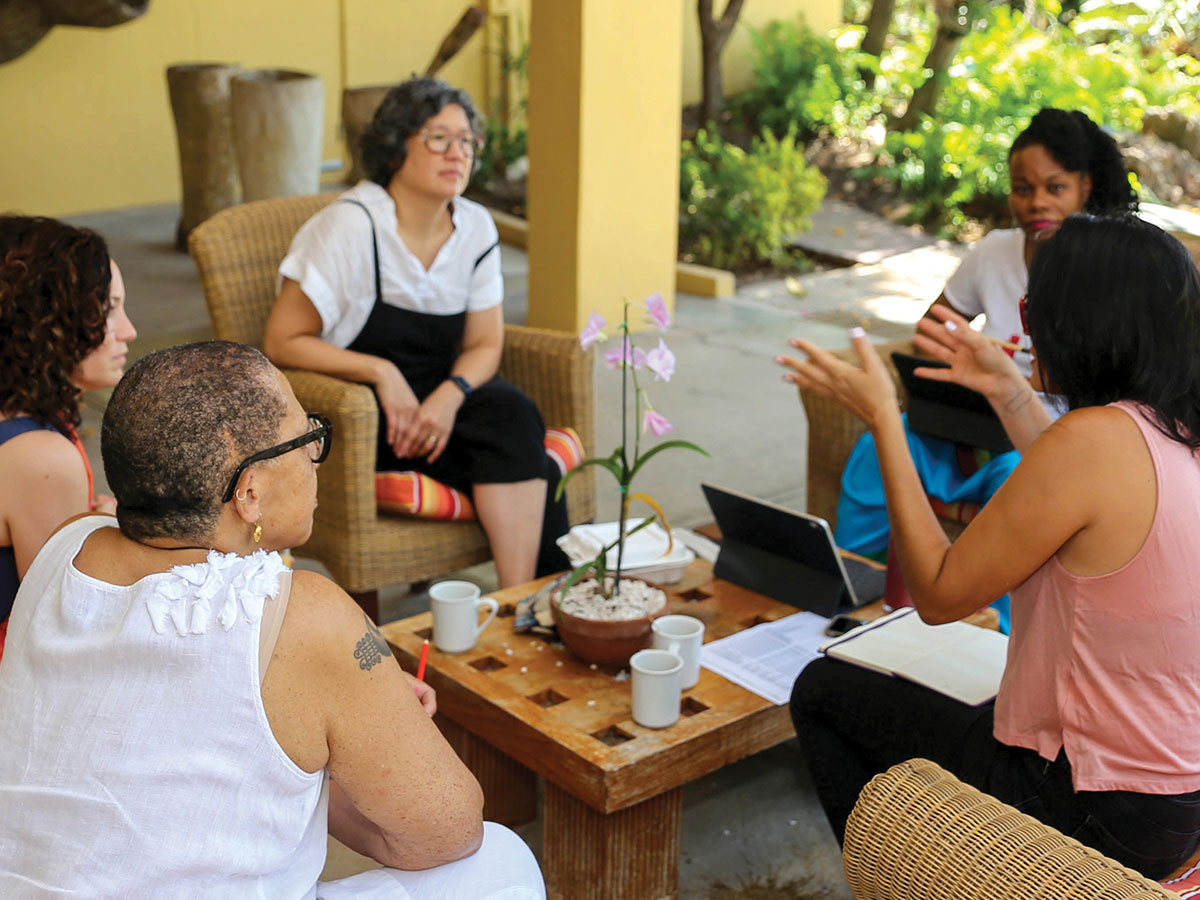4 Ways Grantmakers Are Adjusting Programming Amid COVID-19

Sponsored by WizeHive
They say the only constant is change, and never has that statement felt more true than here in 2020. No matter where you sit, it’s no stretch to say 2020 has been confusing, scary, frustrating, infuriating, and thought provoking. For nonprofits, it’s also been galvanizing. Instead of just worrying about the possible dwindling of donations, the strain on their staff, or the new hurdles in their projects, they have responded to the madness around us with a simple question: how can we help?
Grantmakers have faced this strange new world with fortitude and determination, knowing they can make a difference, however small, and striving to deliver on it.
In March 2020 as the shutdowns began and crisis rolled across the country, we at WizeHive saw our nonprofit community put the brakes on programs and quickly launch new ones, confident in their missions yet open to how they could better serve right now. And we knew we could help. WizeHive was honored to offer no-cost workspaces of the Zengine platform to existing clients launching new or expanded programs directly related to COVID-19, and thrilled that many utilized this offer to make their recovery and response efforts more efficient and impactful. Working in tandem with them to scale urgently needed programs provided amazing insight to the current struggles of grantmakers, and some of the best practices nonprofits are utilizing to become successful.
The programs they ran – or in many cases are still running – ranged greatly in terms of constituents, the communities, and even the countries focused upon. But we saw many common themes emerge as well, far beyond simply the desire to help.
Here are four of them.
Finding a new way to serve an established mission
“Pivot” is one of the biggest 2020 buzzwords in the nonprofit sector, as organizations rush to be responsive and play a part in the changing world.
The Merchants Fund has been serving the small business community of Philadelphia for more than 150 years. With a mission to empower the entrepreneurs that make the city so special, they grant charitable gifts to businesses facing financial hardship.
“We make grants to small businesses – that’s what we do,” explains Jill C. Fink, Executive Director. “When COVID hit, it was like, ‘Wow, now every small business that exists needs help. How do we figure out what it looks like for us to respond to this new need?’”

But with so many more businesses to suddenly serve, Fink and her team knew they could not just continue on the same way. Instead, they replaced their standard, rolling application with a new version that was much simpler and required less work to complete. And while previously grants were usually made to a maximum amount of $10,000, the team decided to reduce the largest offering to $5,000 in order to serve more businesses.
The same thoughts were shared by the staff of the McNulty Foundation, an organization focused on providing and creating opportunities for determined and innovative individuals around the globe. Their flagship program is the John P. McNulty Prize, a $100,000 annual award for exceptional leadership and entrepreneurial spirit to address the world’s toughest challenges. Yet when COVID-19 began sweeping the globe, the team realized there was a new challenge that needed all their focus.
The decision was made with their partners, the Aspen Global Leadership Network, to temporarily suspend the regular McNulty Prize and instead fund COVID-related programs that their former McNulty Prize Laureates and AGLN Fellows were launching in their respective organizations.
In both cases, the nonprofits were still aligned with their missions and overall impact goals, but were able to quickly switch the vehicles through which they were enabling them.
Increase giving as much as possible
At the McNulty Foundation, a decision was also made to award more in grant funding than their typical investment amount.
“It’s been humbling to be of support to these organizations during these incredibly challenging times,” says Nina Sawhney, the foundation’s senior program manager. “Being a global network, everyone was facing a different timeline. With the enormous need, we decided to step up our funding levels, and supported 68 projects around the world with over $550,000. There’s a big call in the philanthropic sector to give more and fund boldly and widely now when it’s needed more than ever. We’re trying to follow that.”
The McNulty Foundation was able to expand their reach and help power programs that addressed everything from providing food, medicine, hygiene kits, and other forms of support to struggling communities to filling the gaps in PPE, testing, and contact tracing.
At The Merchants Fund, Fink and her team discussed a similar approach. They agreed to go above, and when the program launch were surprised to see just how quickly their 2020 grant money was distributed. But they were determined to still do more.
Look for new ways to grow funding
With more and more expressing concern that their businesses were not going to survive, The Merchant’s Fund connected with the City of Philadelphia, which was also looking for ways to support the local small business community. Together they launched a second program, dubbed Restore and Reopen. Using an additional $150,000 from TMF and thanks to a $1.25 million grant from the City of Philadelphia, the program went live with an even easier application and a return to the $10,000 max grant.
It’s a trend that can be seen nationwide, particularly between local government and the community foundations in their jurisdictions. Municipalities are using CARES Act Funding to grant local foundations funds, who in turn regrant them out in a variety of ways.
When the second round of funding became depleted, Fink and her team bravely moved on to phase three and entered the world of fundraising – something the organization has never done before.

Go beyond the grant
It can be easy, as a grantmaking organization, to focus primarily on the grants and funds themselves, as they are the main driver of impact for most programs. But the other elements of a strong grantmaking program – community, support, transparency, accountability – are more valuable in times of crisis than ever.
Let’s Grow Kids is a nonprofit dedicated to ensuring access to high quality, affordable childcare for all Vermont families by 2025. Their efforts range from fundraising to advocating for families with the state legislature to providing direct services to child care employees through grantmaking
The organization found itself in an interesting position as COVID began requiring closures across Vermont. The few child centers that remained open needed not grants but basic supplies, hand sanitizer, masks. And the families of the state needed something else completely.
“With the stay at home orders, child cares were closed,” explains Erin Roche, Director of Operations & Evaluation. “Yet we had essential workers who were still expected to go to work. The state urgently needed a way to keep track of essential workers who needed childcare … so we raised our hands.”
Let’s Grow Kids launched a 10-question survey available via the state emergency operations center and various other agencies for essential workers that asked for basic demographics, the places where they were employed as an essential worker, and information about the children in need of care. They began reaching out to county and regional offices to match families with care, as well as helping the state keep count of essential workers with children.
During its run, the team received help requests from 1250 essential workers on behalf of 2000 children.
“That may not sound like a lot, but we only have 625,000 people in this state,” explains Roche. “That felt like a big deal. Sometimes we felt like a small cog in a very large wheel, but it really mattered knowing that these essential workers in a time of emergency – the people you really need – had what they needed,” says Roche.
In Philadelphia, the team at The Merchant’s Fund found themselves connecting more and more with grantees, not just on how the grant was going, but how the business owners were coping. With COVID and then downtown riots in April, Philadelphia’s small businesses needed more than money – they needed hope.
“It’s heartbreaking,” Fink admits. “There’s a lot of work to be done in these communities. A lot of the businesses hit the hardest were immigrant-owned. And there’s a lot of healing that needs to happen. It’s beyond our primary mission, but we will be involved.”
Header photo credit: VisionSpring, a recipient of the McNulty Foundation’s Global Response Fund, coordinates COVID readiness and response in communities across India.


